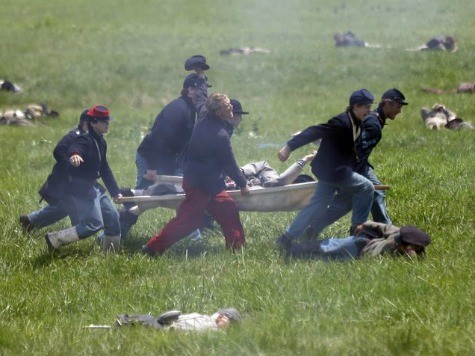
Though the mainstream media hardly covered the commemoration of Pickett’s Charge on the 150th anniversary of Gettysburg, which one historian said “forged” modern America, thousands of Americans battled inclement weather and unbearable traffic to pay homage at Gettysburg on Wednesday.
Breitbart News was the only national outlet that had live coverage of the Commemoration of Pickett’s Charge (see archived video of the coverage here), and Breitbart News Executive Chairman Stephen K. Bannon, who hosted the broadcast, said the broadcast was important not only to honor the sacrifices made on that sacred battlefield but also to keep faith with non-elite “middle Americans” who valued America’s exceptionalism.
No story from the broadcast better reflected the enduring legacy of Pickett’s charge than the one told by Wayne Motts, the CEO of the National Civil War Museum and an author of a book on Gen. Armistead. Motts recalled a story about Henry Owen, a soldier who survived Pickett’s Charge. Owen wrote a letter to his wife after the battle and described a recurring dream he was having in which a shadow followed him throughout and told him that he was the angel that protected him during Pickett’s Charge and promised never to “leave nor forsake you.”
Motts said Owen broke down after those dreams, because anyone who survived Pickett’s Charge, even if they were not physically hurt, were psychologically scarred for life.
“Day three will never leave you,” Motts said.
Bannon said “Day three” has never left the American people, and it is seared into the American memory and to those of many throughout the world.
Indeed, it is.
Robert Child, who will direct the Battlecast of Pickett’s Charge this Sunday, which can be seen here, said over 100,000 people will come to Gettysburg on Sunday to see the Battlecast and over 250,000 people will come this week to Gettysburg for the 150th anniversary. Bannon noted how thousands braved torrential rain on Tuesday to gather and learn about Gen. Meade, while thousands more gathered at 6 AM Wednesday to get a tour of the battlefield.
Pete Carmichael, the Director of the Civil War Institute, said anyone who thinks Americans are apathetic about history just needs to “spend a few minutes here.” He said he was in “awe” of the enthusiasm this week and noted many of the historians and authors who came to Gettysburg have said they were inspired when they first came to the battlefield as children. Carmichael emphasized how important it was to enable children to “catch the bug early” by bringing them to Gettysburg.
He said this week proved that Americans “crave history,” and it was “overwhelming” and “inspiring.”
Bob Kirby, the Superintendent of Gettysburg National Park, said one cannot experience Gettysburg until one actually comes to the battlefield. He said Gettysburg was the “people’s park” and played a crucial role in preserving our past.
Jim Hessler, a battlefield guide, said he felt a special responsibility to honor the sacrifices made on the battlefield and noted guides like himself were “the keepers of the memories” that have to be passed on to the next generation.
Bruce Mowday, the author of Pickett’s Charge: The Untold Story, noted that the soldiers at Gettysburg were everyday Americans like “printers and painters” who were from occupations from all walks of life. He said some fought to preserve the Union while others fought for honor and duty. And while the soldiers all had different reasons for fighting, they “were Middle American then,” and he said they had much in common with Middle Americans today who value Gettysburg’s sacred ground.
One re-enactor told Bannon that it was great to see so many people still interested in Gettysburg and passionate about its history. He marveled that the current generation had a “sense of awe” about Gettysburg and agreed with historians who said Gettysburg served as a “connective tissue, a woven fiber” that connects one generation of Americans to the other. The re-enactor noted that that “spirit was definitely there today” and emphasized, along with Bannon, that nearly half of the 10,000 people in attendance on Wednesday were under 30 years of age.
Eric Lindblade, a Gettysburg historian and an expert on the regimental history of the 26th North Carolina, said Americans can connect to the individuals that made the ultimate sacrifice at Gettysburg because they were, in many ways, no different from ordinary Americans today.
“The story of the Civil War was made up by regular people who through no fault of there own were caught up in this national tragedy,” he said.
**Battlecast** Sign up today and watch the Gettysburg re-enactment live!

COMMENTS
Please let us know if you're having issues with commenting.